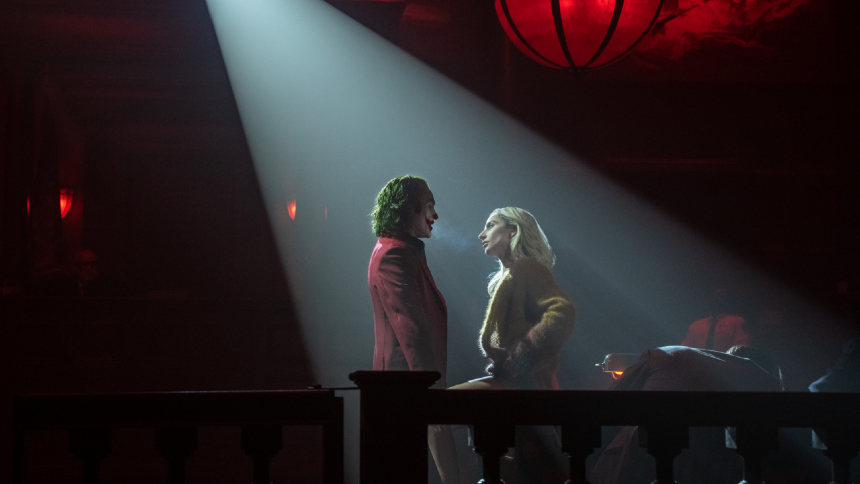JOKER: FOLIE A DEUX Review: Sweet Psycho Romance Stuck in an Edgelord's Mess

Whether she's loved the character since she was a child or is making a calculated attempt at winning an acting Oscar, Lady Gaga's performance as the Joker universe's Harley Quinn is by far the best thing to come out of the two movies. She sometimes literally brings light into the dark grays and sickly yellow greens of the second Joker film, adding much needed contrast to the miserablism of Joker/Arthur Fleck's (Joaquin Phoenix) world.
To be fair, Joker: Folie à Deux's miserablism does look at least a bit different than the first film's. Fleck is confined to Arkham State Hospital (get it? it's like Arkham Asylum, but not, cool!) where he awaits trial before the film transforms into a courtroom drama once the trial begins. Stuck in that narrative is the titular "madness for two."
Lee (as Gaga's not your daddy's Harley Quinn is called) arrives early in the film as a classmate in a singing class for patients, and immediately strikes up a connection with Arthur. She tells him they're from the same neighborhood, have experienced the same things, and that when he shot a talk show host on live TV, she didn't feel alone anymore. Having found a kindred spirit, Arthur falls hard and fast, introducing the movie's musical element in the first of many numbers that are only in his imagination.
While that "only in his head" part is frustrating, it allows co-writer/director Todd Phillips to go big in a way that would break the world of the film otherwise. These scenes work as spectacle, bright colors and glaring stage lights combined with Gaga and Phoenix giving their all in voice and body, making for a fun watch.
But it's the musical scenes that take place in the film's reality that are affecting, as they are the heart and primary driver of the romance. That romance is sweet and nearly as moving as the best other stories about outsiders who find each other and fall in love. The ups and downs of the burgeoning relationship pull viewers into the nervous excitement and sheer anxiety of a new love in a world as dark as this one. If only that darkness could remain the backdrop for a love story instead of the other way around.
The only moment early in Lee and Arthur's romance that doesn't quite fit is a sex scene. I'm generally in favor of more sex scenes, not fewer, but the scene feels like Phillips pressing the "isn't it crazy that I'm doing this in a Batman movie?" button; a button he breaks by the end of the movie. There's a group rape, mentions of Arthur's history of sexual abuse, and a scene that repeatedly attempts to make viewers laugh because a little person is short. That last one isn't on the same level of cruelty as the others, but it's part of the same general attitude of weak provocation that characterizes the film as a whole.
In its final moments, the movie pushes beyond social provocation to pure attempts at shock in the form of "unexpected" violence. "Unexpected" because one instance is telegraphed multiple times throughout the film, and others are part and parcel of Arthur's fantastical musical numbers even if they are abrupt.
It's another way in which Joker: Folie à Deux can't escape the sense that it's just trying to get a rise out of its audience. Which is a shame, because it could have been a simple, sweet weirdo love story.
The film is now playing nationwide, only in theaters, via Warner Bros. Visit their official site for locations and showtimes.







